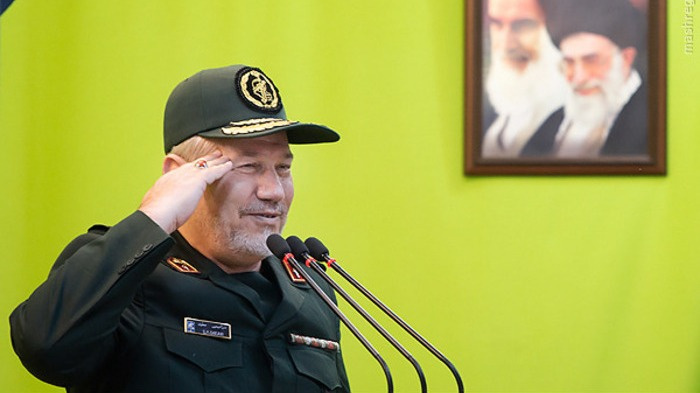Friday Prayers’ Sermons: Beware of enemy’s infiltration

(Gen. Yahya Rahim Safavi speaking to the Friday prayers' congregation; Photo: Soheil Sahranavard, Fars News)
Friday prayers across Iran on September 19, 2015 revolved over two main themes: the crane collapse in Mecca which led to death of 108 pilgrims, and the threat of Western infiltration after the nuclear agreement.
In Tehran, Ayatollah Kazem Seddighi slammed the Saudi Arabian government for the deadly incident, calling it a result of the Saudi Royal House's incompetency. In Tabriz in northwest Iran, Mohammad-Taghi Al-e Hashem also criticized the Saudi regime. According to Ayatollah Al-e Hashem, the catastrophe showed the world that the Saudi Household is not qualified to serve as the 'Custodian of the Two Holy Mosques." In Esfahan in central Iran, and the Sunni-majority city of Boukan in Kurdistan, Friday prayers' leaders also bashed the Saudi Household, reminding their congregation of the 1987 massacre of Iranians demonstrators in Mecca.
Friday prayers' leader reiterated Supreme Leader Ayatollah Khamenei's warning about the threat of West infiltrating Iran after the nuclear deal.
The conservative Ayatollah Alamolhoda, Friday prayers' leader of Mashhad, warned about cultural, intellectual and political infiltration of the enemy, the West, into Iran. An ardent critic of liberal cultural policies of successive Iranian governments, Alamolhoda warned about the spread of libertinism in the guise of art and entertainment. He called democracy the open gate through which the enemy can realize its political infiltration and called for citizens' vigilance candidates in the upcoming parliamentary elections.
In Tehran, on the eve of the 35th anniversary of Iran-Iraq war, two former IRGC members spoke before the main sermon.
Hamid-Reza Moghaddamfar, IRGC deputy on social and cultural affairs, warned about the enemy's intention "to use the JCPOA and nuclear negotiations as a bridge to re-infiltrate the country." "The biggest threats against this country are the cultural and political dimensions of this infiltration" he added.
Moghaddamfar, former head of Fars News Agency, also targeted Rouhani's administration in thinly veined remarks: "a number of politicians used to fight against the US before the revolution, but they have changed their mentality now. They are now asking: how long does it take before we reconcile with the US?" "It is you who has changed, not the US", he reminded these politicians, reminding them that the US has retained its imperialist character. Speaking of ex-revolutionaries in decision-making circles, he called them 'monafegh', (hypocrite), an offensive label in the Iran's political culture.
Former IRGC commander Yahya Rahim Safavi also spoke for in Tehran congregation. Safavi was unequivocal in criticizing Arab states of the Persian Gulf for their diplomatic conduct after the Iranian Revolution. Safavi referred to Kuwait's financial support for Saddam Hussein during the 8-year war that he waged against Iran, and reminded of the "divine punishment" Kuwaitis faced after Saddam attacked their country during the Second Persian Gulf War. He also slammed the Saudi Kingdom for military assault against Yemen. "It will bring nothing but defeat and disgrace" for the Saudis, he said.

